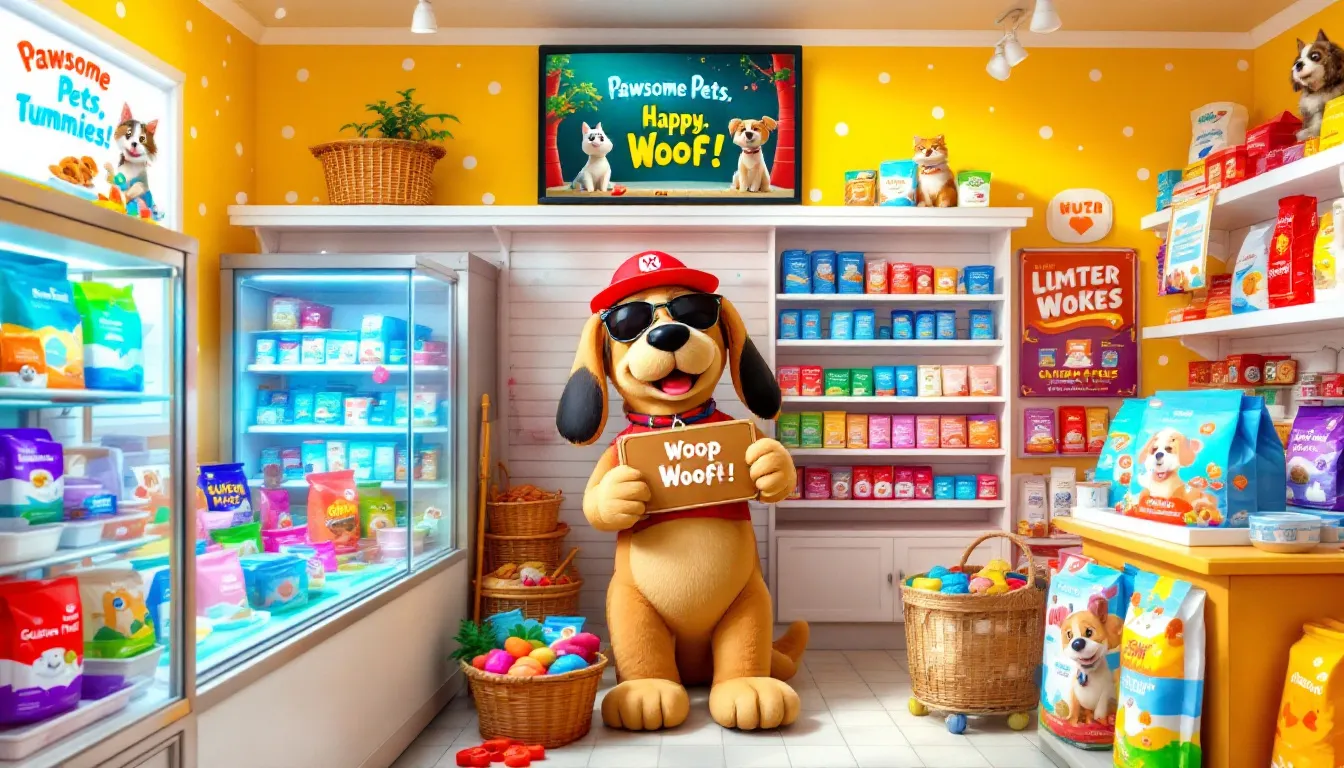Wondering how private label pet food can boost your brand? This guide explains the various types of pet food — dry, wet, and raw — and what makes them unique. You’ll also learn about key ingredients, and how offering specialized options can satisfy your customers and enhance your brand’s reputation.
Understanding different types of pet food
Pet food comes in various forms, each catering to different dietary needs and preferences. The main categories include dry, wet, and raw diets, each with unique benefits and challenges. Grasping these types helps in making informed decisions about the best products to offer through your brand.
Whether you’re stocking your pet supplies with dry kibble, offering premium wet food options, or introducing raw and fresh diets, knowing the ins and outs of each type can help you better serve your customers’ needs.
Dry pet food

Dry pet food, commonly known as kibble, is a staple in many pet stores due to its convenience and long shelf life. There are two main types: extruded and cold-pressed. Extruded dry pet food is created by cooking a meat mixture into a dough, forming it into kibble, and then drying it. This method ensures the kibble is easy to store and serve, which makes it popular among pet owners.
In contrast, cold-pressed dry pet food uses lower temperatures during processing, which helps preserve more nutrients, offering a potentially more nutritious option for pets. These dry pet food types offer nutritional benefits and convenience for pet owners.
Extruded kibble is widely available and often comes in various flavors and formulations to meet different dietary needs. Cold-pressed kibble, on the other hand, can be marketed as a premium product due to its higher nutrient retention, appealing to health-conscious pet owners. Offering a variety of dry food options caters to diverse customer preferences, enhancing your store’s appeal.
Wet pet food
.jpg?width=464&height=309&name=Untitled%20design%20(28).jpg)
Wet pet food, with its high moisture content, typically ranging from 70% to 80%, is a great choice for pets needing extra hydration or those with a decreased appetite.
Available in various forms such as:
- paté
- chunks
- mousse
- shredded
- soups
- stew
- loaf
- broth
Wet food can be highly appealing due to its rich aroma and flavor. Such options are excellent for picky eaters or pets transitioning from dry food.
Packaging options for wet pet food are diverse, including cans, alu cups, pouches, tetra, trays, and bottles. This variety allows pet stores to offer a broad selection to cater to different consumer preferences.
Canned wet food, for instance, is often preferred for its convenience and long shelf life, while pouches and trays can be more user-friendly for portion control. Providing a variety of wet food options enhances your product offerings and can attract a loyal customer base.
Key ingredients in quality pet food
High-quality pet food is distinguished by its use of premium ingredients, which are essential for supporting overall pet health. Such food should feature high-quality proteins, digestible grains, and beneficial supplements. Recognizing these key components helps in selecting or developing products that meet high-quality standards, making your brand stand out.
Proteins
Proteins are the cornerstone of any quality pet food, providing essential amino acids that are crucial for growth, repair, and overall health. Common protein sources include chicken, beef, and fish, which are widely recognized for their nutritional benefits. Additionally, specialized alternatives like buffalo and horse meat are gaining traction, offering unique selling points for premium products.
Nutribiotic is a notable supplier in this sector, known for its high-quality ingredients tailored for premium pet food formulations. Incorporating specialized ingredients from reputable suppliers enhances the nutritional value of your products, meeting the demands of health-conscious pet owners and setting your brand apart.
Grains and vegetables
Grains and vegetables are important components of pet food, providing necessary carbohydrates, fiber, and essential nutrients. Common grains like rice and barley are easily digestible and offer a valuable energy source for pets. Vegetables such as sweet potatoes and peas are also popular for their nutritional benefits, contributing vitamins, minerals, and fiber to pet diets.
These ingredients enhance the nutritional profile of your pet food formulations, appealing to pet owners seeking balanced diets. Sweet potatoes, for example, are not only nutritious but also highly palatable, making them a favored choice in many high-quality pet foods.
Offering products with wholesome grains and vegetables meets the diverse dietary needs of pets.
Supplements
Supplements play a critical role in ensuring pets receive all the necessary nutrients for optimal health. Key supplements include essential vitamins and minerals, with specific products like milk powder being particularly beneficial for young animals. Milk powder, for instance, provides vital nutrients that support the growth and development of puppies and kittens.
.jpg?width=466&height=310&name=Untitled%20design%20(29).jpg)
Pet health supplements are available in various forms, including chews, powders, liquids, and pastes, each tailored to different health needs. Chewable supplements are often favored for their taste and ease of consumption, while powdered supplements can be easily mixed with food.
Incorporating a range of supplements into your product line caters to specific pet health needs, enhancing your brand’s reputation for quality and care.
Specialized pet food products
The pet food market is evolving, with specialized products becoming increasingly popular. These products cater to unique dietary needs and preferences, providing an opportunity for one company to differentiate itself among private label brands.
Successful private label brands leverage innovative marketing strategies and unique product offerings to stand out from national brands and private labels, meeting the growing demand for specialized pet food products.
Pet snacks

Pet snacks are an integral part of the pet food market, offering a variety of options to satisfy both dogs and cats. Common pet snacks include liquid snacks, biscuits, and a wide range of treats designed to appeal to different tastes and preferences. Biscuit treats, for example, come in various flavors, making them a versatile choice for pet owners looking to reward their pets.
Treats designed for training serve a dual purpose, acting as both rewards and motivators, enhancing the training experience for both pets and owners. Stocking a diverse range of pet snacks caters to different customer needs, from everyday treats to specialized training aids, enriching your product offerings.
Pet supplements
.jpg?width=475&height=713&name=Untitled%20design%20(25).jpg)
Pet supplements are essential for addressing specific health needs and enhancing overall well-being.
Available in various forms such as:
- chews
- powders
- liquids
- pastes
These supplements can improve coat health, reduce inflammation, and support digestive health. For instance, omega fatty acids are known to enhance coat health, while probiotics help maintain a balanced gut flora.
Choosing the right supplements can significantly impact a pet’s health, making it crucial to offer high-quality options. Including a variety of supplements in your product line addresses a wide range of health concerns, positioning your brand as a comprehensive provider of pet health solutions.
Unique offerings

Unique pet products are increasingly sought after by pet owners looking for innovative solutions to enhance their pets’ lives. Examples of such products include Himalaya bones and pillows for dogs and cats, which not only serve as treats but also promote wellness and enrichment. These specialty items can set your private label brand apart from established brands, offering something new and exciting to your customers.
Incorporating unique offerings into your product line creates a distinctive brand identity that resonates with pet owners seeking exclusive and beneficial products. This approach helps build a loyal customer base and drives sales, further establishing your brand in the competitive pet food market.
How to choose the right pet food manufacturer

Selecting the right pet food manufacturer is essential for building a successful private label brand. As the demand for specialized pet food grows, choosing a manufacturer that aligns with your business goals and quality standards is key.
At GC Consulting, we provide expert guidance to help you identify, evaluate, and partner with the ideal manufacturer for your brand.
Define your product needs
Understanding your target market and the specific dietary requirements of pets is the first step in selecting a manufacturer. Whether you aim to offer grain-free, organic, or breed-specific formulas, identifying these factors early on ensures a seamless production process.
GC Consulting specializes in assisting businesses with product development, from ingredient sourcing to recipe formulation, ensuring your pet food aligns with industry standards and consumer preferences. We also help navigate compliance requirements, ensuring your products meet all necessary regulations.
Assess manufacturer capabilities
Evaluating potential manufacturers is crucial in securing a reliable partnership. Key factors to consider include:
- Quality control & certifications: A manufacturer with strong quality assurance protocols and recognized certifications ensures consistency and safety.
- Production capacity & scalability: Can the manufacturer meet your initial order needs and grow with your brand?
- Reputation & reviews: Past client feedback and case studies can offer insights into reliability and service quality.
GC Consulting streamlines this process by providing in-depth manufacturer assessments and matching you with partners that align with your brand’s vision and operational requirements. Our expertise ensures that you collaborate with trusted manufacturers that uphold high industry standards.
Secure favorable terms & ensure quality
Before committing to a manufacturer, it’s essential to request product samples to verify quality and consistency. A thorough review of ingredient sourcing, packaging, and final product presentation will help maintain your brand’s reputation.
Negotiating favorable terms, including pricing, production timelines, and delivery logistics, is another critical step. GC Consulting supports you in contract negotiations, ensuring cost-effective and efficient manufacturing agreements that benefit your business.
Partner with GC Consulting for a seamless process
Choosing the right pet food manufacturer can be complex, but with GC Consulting, you gain a strategic partner to navigate the process smoothly. From product development and regulatory compliance to manufacturer selection and contract negotiation, we provide end-to-end support to ensure the success of your private label pet food brand.
Contact GC Consulting today to take the next step in launching a high-quality pet food brand tailored to your market’s needs.
Benefits of private label pet food

Private label pet food provides numerous advantages for brands and retailers. Private labeling allows you to tailor products specifically to your market’s needs, offering customization options, higher profit margins, and the ability to build a strong brand identity.
These benefits help you stand out in the competitive pet food industry and build a loyal customer base.
Customization options
One of the most significant benefits of private label pet food is the ability to create unique formulas that cater to specific market needs. Private labeling allows businesses to tailor products to customer preferences, enhancing satisfaction and loyalty. For example, you can develop recipes that address particular dietary requirements or preferences, such as grain-free or high-protein diets.
GC Consulting specializes in guiding companies through the process of developing private label pet food brands tailored for international markets. Leveraging their expertise ensures your products stand out in the market and meet the specific needs of your target audience, enhancing your brand’s appeal within the same company.
Higher profit margins
Higher profit margins are a significant advantage of selling private label products compared to resale products. Private label products often result in better profit margins than national brands, allowing businesses to increase their revenue and invest in further growth.
Offering private label products allows you to provide unique offerings that set your business apart from competitors. This strategy drives higher profit margins and strengthens your market position, making your private label line brand more attractive to consumers.
Brand identity
Building a strong brand identity is crucial for distinguishing your pet food products in a competitive market. Private label products help build brand recognition and trust among consumers, fostering customer loyalty and influencing purchasing decisions.
A well-established branded identity through private labeling can significantly enhance your market presence and success. Creating a recognizable and trusted store brand attracts and retains customers, driving long-term growth and profitability for your business with branded products.
GC Consulting
GC Consulting specializes in creating and exporting new pet food brands for international markets. With more than 10 years of industry experience, GC Consulting has built an extensive network of manufacturers, distributors, and brand owners, offering unparalleled assistance to expand pet food businesses. Recently, GC Consulting has been labelled Verified Supplier by Torg: https://usetorg.com/suppliers/gc-consult
GC Consulting’s expertise in private label pet food brands enables retailers to offer unique products tailored to specific customer preferences. Leveraging their services helps develop and launch successful private label lines that stand out in the global market, ensuring your brand’s growth and success.
Summary
In conclusion, private label pet food offers numerous benefits, from customization options and higher profit margins to building a strong brand identity. By understanding the different types of pet food, key ingredients, and specialized products, and by choosing the right manufacturer, you can successfully develop and launch a private label line. With the expertise of GC Consulting, you can navigate this exciting venture and ensure your brand stands out in the competitive pet food market.
Empower your brand and elevate your business with private label pet food >
Frequently asked questions
What are the main types of pet food?
The main types of pet food are dry, wet, and raw diets, each providing distinct advantages and catering to various dietary requirements. Choosing the right type depends on your pet's health, preferences, and lifestyle.
What are the benefits of private label pet food?
Private label pet food provides customization options and higher profit margins, enabling businesses to meet specific market needs and enhance brand identity. This strategic approach helps differentiate products in the competitive pet food industry.
How do I choose the right pet food manufacturer?
Selecting the right pet food manufacturer is essential for building a successful private label brand. The process involves researching industry standards, evaluating production quality, and ensuring compliance with regulations. GC Consulting guides businesses through every step, from recipe formulation to manufacturer selection, helping brands secure reliable partnerships that align with their vision and quality standards.
What are some examples of specialized pet food products?
Specialized pet food products include options like Himalaya bones and pillows, along with raw diets featuring buffalo meals and fresh horse meat. These products cater to specific dietary needs and preferences of pets.
How can GC Consulting help with developing a private label pet food brand?
GC Consulting can significantly assist in developing a private label pet food brand by providing expertise in recipe formulation, ensuring compliance with industry regulations, and navigating the complexities of regulatory requirements. This support facilitates the successful launch and growth of your private label line.




